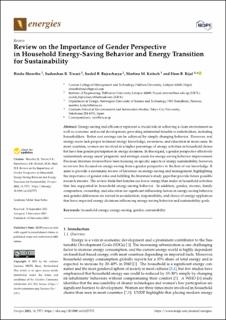| dc.description.abstract | Energy-saving and efficiency represent a crucial role in achieving a clean environment as well as economic and social development, providing substantial benefits to stakeholders, including householders. Better cost savings can be achieved by simply changing behavior. However, real energy users lack proper technical energy knowledge, awareness, and education in most cases. In most countries, women are involved in a higher percentage of energy activities in household chores but have less gender participation in energy decisions. In this regard, a gender perspective effectively understands energy users’ pragmatic and strategic needs for energy-saving behavior improvement. Previous literature reviews have been focusing on specific aspects of energy sustainability; however, no review has focused on energy-saving from a gender perspective to the best of our knowledge. It aims to provide a systematic review of literature on energy-saving and management, highlighting the importance of gender roles and fulfilling the literature’s study gaps that provide future possible research streams. The review finds that females use lower energy than males in household activities that has supported in household energy-saving behavior. In addition, gender, income, family composition, ownership, and education are significant influencing factors in energy-saving behavior, and gender differences are rooted in socialization, responsibility, and choice of energy appliances that have impacted energy decisions influencing energy-saving behavior and sustainability goals. | en_US |

